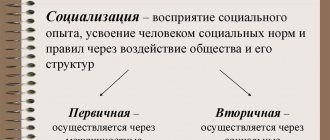The first interpretations of the concept under consideration
They are indicated in the first dictionaries of the Russian language of the 11th – 12th centuries, namely:
- reason, prudence, intelligence are wisdom;
- scholarship, body of knowledge - great wisdom;
- moral perfection, spiritual purity - humility;
- religious piety is wisdom;
- mastery, perfection, skill - perfect wisdom;
- slyness, trickery, cunning - sophistication.
Achieving Knowledge is a condition for gaining faith
A person will not be able to gain deep faith in the unity of the Almighty, who rules the entire universe, unless he rises to the level of True Knowledge.
However, the question arises: if the acquisition of Knowledge leads a person to the point that everything experienced by the soul becomes an immutable conviction, is there no danger of becoming a convinced apostate?
Not in the least! Throughout my life, I have met different people and been exposed to different opinions, but I have not seen anyone who became an apostate as a result of gaining deep knowledge.
After all, whatever a person’s views on the mystery of the origin of the world, they will never become so obvious to him that he considers them more significant than faith in G-d. After all, the miracle and mystery hidden in everything, even in the true essence of inanimate objects, do not diminish after all the explanations. No experiments or studies shed more light on the mystery of the universe than the true faith of even an ignorant person. And even more so this concerns the greatest mystery of such creations as plants, animals and humans!
But thanks to Knowledge, a person’s faith becomes for him a conviction and an immutable truth. After all, we feel faith everywhere. We are not even talking about great people to whom the secret of G‑d, the wonders of the universe and G‑d’s governance have been revealed. It is easy for them to believe in G-d, because the gates of wisdom are open before them, and they constantly see and feel the power of the Almighty, who created everything and gives existence to everything. Many fail to reach such a high “human level” to penetrate into the Divine secret. However, if the Almighty has gifted people with common sense, then wide opportunities open up before them through the Wisdom of the Torah, science, and knowledge of the world to see the power of a single Essence that sets the entire universe in motion! How can a person endowed with reason not notice this and not come to faith?! It is easy for even the most ignorant people to gain some understanding of G‑d because they see events happening in the world toward a common goal. And the presence of a single goal testifies to the existence of the One who predetermined it and directed everything in the world towards its implementation. You just need to elevate yourself to the level of Knowledge, learn to perceive and comprehend the truth and base your entire life in this world on it.
Modern interpretation of the concept in question
Wisdom is the ability to competently apply one's knowledge. This concept also means a deep mind, which is supported by life experience; the ability to find solutions in the most difficult situations; understanding the essence of what is happening.
Wisdom is a person’s valuable ability to both think deeply and act in accordance with high life goals, while being above limited private, transitory interests, including one’s own. This is the initial impulse of the evolution of philosophy, the final synthesis of its directions.
According to M. Epstein, this concept is interpreted as follows:
- Wisdom is the deepest knowledge, the required ability to use it effectively and masterfully.
- This term implies the ability to separate the unattainable from the inevitable; give up the first, come to terms with the second. Constantly balancing on the edge.
- Wisdom is a thirst for knowledge and world events that comes from the heart and soul. Epstein believed that a wise person has such intelligence because he is interested in everything.
- He called it a lack of narcissism, a willingness to admire and admire others, this is the look of a child with adult actions.
- The wisdom of a person is his ability to find in another, any phenomenon, what needs to be learned. Usually, know-nothings teach others.
- Wisdom is interpreted as a correct understanding of the values of life, an intuitive foresight of the probable only correct development of the situation.
Teachings of Socrates
In the history of philosophy, perhaps, there is no figure more famous to us than Socrates. Even in ancient times, he became for us the embodiment of wisdom, the ideal of a sage who put truth above life. The idea of him as a synonym for wisdom, courage of thought and heroic personality has been preserved in our times. A huge literature has accumulated about Socrates, his personality and teaching. And yet, in the history of philosophy, there is perhaps no more mysterious and enigmatic figure than Socrates. The fact is that Socrates himself did not leave even a line of philosophical works (in those days when the book was a handwritten rarity, the advantages of speech over writing, its unprecedented expressiveness and the possibility of reacting to the audience were obvious to everyone). Because of this, the teachings of Socrates are collected on the basis of secondary sources, primarily the Socratic conversations of early Plato, information from the historian Xenophon, Diogenes, as well as the ideological opponents of Socrates (the “father of comedy” Aristophanes) and the books of later authors (for example, Aristotle), each of the above, understood Socrates in his own way,1 and all this makes it very difficult to reproduce the truly historical figure of Socrates. Attitudes towards Socrates were different at different times, often completely opposite. Some of his contemporaries saw him as a dangerous atheist and sentenced him to death, others considered this accusation to be unfounded and presented Socrates as a deeply religious person. In other times and up to the present day, Socrates has also been and is assessed differently. For some, he was a great philosopher, for others, a boring moralist, for others, a political reactionary. Therefore, the old and ever-new question is still relevant today: is objective knowledge about Socrates and his Teaching possible?
At the center of all Socratic philosophizing are questions about moral virtues, the moral qualities of a person. In essence, the teaching of Socrates is a moral philosophy, ethics.
Socrates focused his attention on man and his behavior, considering these problems to be the most important for philosophy. This made it possible for Cicero to say that Socrates “lowered” philosophy from “heaven to earth” (in other words, Socrates raised philosophy “from earth to heaven”). According to Xenophon, Socrates primarily explored ethical issues concerning “what is pious and what is impious, what is beautiful and what is ugly, what is just and what is unjust.”2
For Socrates, knowledge and actions, theory and practice are one: knowledge (the word) determines the value of “deed,” and “deed” determines the value of knowledge. Hence his confidence that true knowledge and genuine wisdom (philosophy), available to man, are inseparable from just deeds and other manifestations of virtue. From the point of view of Socrates, one cannot be called a philosopher who has knowledge and wisdom, but, judging by his way of life, is devoid of virtue.3 Thus, one of the distinctive signs of true philosophy and a true philosopher is, according to Socrates, the recognition of the unity of knowledge and virtue . And not only recognition, but also the desire to realize this unity in life. In accordance with this, philosophy, in the understanding of Socrates, is not reduced to purely theoretical activity, but also includes practical activity - the correct course of action, good deeds. In a word, wisdom is virtue, that is, knowledge of good, which includes the internal experience of good and therefore encourages good deeds and keeps us from doing bad.
The moral and ethical meaning of the human search for truth and the acquisition of knowledge is predetermined by the fact that the origins of both knowledge and morality go back, according to Socrates, to the gods. The measure of human virtue is the measure of his communion with divine wisdom, and the process of cognition takes on the character of a moral action, a moral act. The path of knowledge outlined by Socrates is his school of virtue.
True knowledge - knowledge through concepts - is accessible, according to the Socratic concept, only to a few, sages, philosophers. But not all wisdom is available to them, but only a small part of it. Wisdom is knowledge, but man cannot know everything. “...It is impossible for a person,” said Socrates, “to be wise in everything. Therefore, whatever one knows, in that he is wise.”4
But this human wisdom, according to Socrates, is worth little compared to divine wisdom. And ordinary, unenlightened opinion means very little in this regard. “...Personally, he,” writes Xenophon about Socrates, “put all human considerations at nothing before the definition of the gods.”
Socrates believed that wisdom lies not in deep knowledge, but in following the daimon - the inner voice, the voice of the soul, conscience. He did not impose the truth, but helped his students find it themselves in their own souls. A meeting with Socrates became for a person a meeting with himself. His simple questions still force us to rethink our lives and that is why they turn out to be incredibly difficult. We all, of course, strive to know the truth, but we often prefer a more comfortable delusion and compromise with our shortcomings. It is easier to reason than to make an effort to change. Socrates showed that knowledge is the fruit of an effort not so much intellectual as moral.
Benefits of Wisdom
It gives the following:
- a basis for improvement, teachings that are never-ending;
- food for the mind, soul;
- the ability to both see the present and foresee the future;
- freedom from passions, bias, unnecessary emotions;
- independence, since a wise person is never attached to luxury;
- understanding the logic of what is happening around.
What is it to be wise
Most people understand the meaning of the concept of mind. And wisdom is not knowledge in itself. It represents a certain value that a person acquires over the years. Time is of the essence. Sometimes a person is credited with “innate” wisdom. It is unlikely that such a concept applies to a young man, a girl, or a child. The accompanying context usually implies the presence of certain qualities - patience, tact.
It is possible to be young and smart, but it is impossible to be wise: emotions, heightened instincts, violent reactions, ambitions, and ardor get in the way. In addition to knowledge, wisdom gives prudence and calmness.
Wisdom of life: what is it?
It is interpreted as the ability to competently use acquired knowledge. The path to great wisdom is thorny and tortuous. But do not forget that it is possible to overcome it. To do this, you will first need desire and several other points.
Life wisdom is the deepest knowledge and understanding that comes, as a rule, in adulthood. It brings joy to life only if a person knows how to share it.
According to statistics, women are the most likely to gain wisdom. Such understanding occurs regardless of one’s social position (it is not necessary to have a higher education for this). Worldly wisdom is an unpredictable phenomenon.
Wisdom originates in close attention to one's own person. People become calmer and more balanced if there are no evil forces such as envy, hypocrisy, hatred, and lies in their environment. In the absence of falsehood and lies in interpersonal relationships, each person becomes closer to wisdom.
Wisdom Wise Sage
Wisdom is intelligence infused with conscience.
Fazil Iskander
Wisdom as a personality quality is the ability to understand higher, holistic, spiritual and practical knowledge and make it part of one’s experience; be able to draw conclusions without logic, without using logical connections, evidence, build your thinking on the principles of a system of restrictions; in internal conversation, hear only your mind and intuition; know exactly the sequence of your actions; to see where what is happening leads to and with the right word give rise to the right actions of others; respect the advice of others; stand in relationship with life on the platform of the humble Disciple.
When the Wise Pig was asked what she thought about wisdom, she answered without hesitation: “True wisdom does not presuppose the presence of knowledge, but the correctness of actions; not accomplishing great deeds of a great mind, but avoiding nonsense; not the study of circumstances through one's own efforts, but the memory of other people's failures. True wisdom does not tolerate excesses and bragging, which is always held in high esteem by people, which is why there are few wise people: there is a lot of work, but little glory. “Tell me, Pig,” they asked her, “what is the work of avoiding mistakes?” “In the fight against the desire to do something stupid, and if successful, in the fight against one’s own pride, leading to troubles and shame,” answered the Wise Pig.
L.N. Tolstoy defined wisdom as “knowledge of eternal truths applicable to life.” A person can memorize all the encyclopedias in the world, but still not gain wisdom. Informative knowledge reaches the mind and settles on the status of theory. A person understands everything, but for various reasons he does not want to apply new knowledge in his life. Knowledge that has reached the mind is questioned, analyzed, and compared with existing knowledge and life experience. A wise person, convinced of the truth and authority of knowledge, makes it part of his experience, that is, puts it into practice. Wisdom is knowledge that has been competently entered into life.
For example, a person knows that the mind and the central nervous system rest from 21 to 24 hours, that if you go to bed later, the body is gradually destroyed, the immune system suffers and at some point it will definitely fail. Diseases will fall immediately, like an avalanche. He knows this, but, engaging in self-deception, he convinces himself that he is a “night owl.” This is not wisdom, but its opposite - stupidity. In other words, wisdom as a quality of personality carefully listens to the point of view of another person, weighs the received informative knowledge on the scales of truth and authority, analyzes it, compares it with one’s worldview and, having convinced itself of its correctness, seeks to use it in one’s own or someone else’s practice.
A sage sees trends in the development of events and can guide people along the right path with the right words. Wisdom is the ability to make the only correct decision in the interval between the emerging problem situation and the reaction to it. Wisdom knows how to act correctly in the most difficult situations. A smart, resourceful person will be able to “get out” of a difficult situation. Wisdom, as a rule, does not get into such situations, calculating the consequences of its actions in advance. Of course, no one is exempt from life lessons, just like from physical education lessons. Wisdom also accepts the challenges of life, sees new opportunities in them and wisely solves them as tasks necessary for further personal growth.
Wisdom is the absence of pride; it is the humble position of the Student in relationships with the outside world. “Live forever, learn forever” is the life motto of wisdom. The taste of wisdom is the taste of discipleship. Realizing its own smallness and the insignificance of existing knowledge, wisdom always opens its mind to new knowledge. The mind is blocked by egoism. Wisdom is the mistress of her mind, which easily controls insatiable feelings and a restless mind. Life for her is an eternal Teacher and Advisor. Unlike pride, it believes that life is perfect and I am imperfect. Therefore, I need to change myself for the better, cultivate virtues in myself, then the vices will be painlessly pushed out of my character, as manifested personality traits. Confucius said: “A wise man is ashamed of his shortcomings, but is not ashamed to correct them.”
Wisdom understands that there are no drafts in life. Everything is written white and clear, the first time. As the English proverb says: “If everything could be done a second time, everyone would be wise.” Therefore, wisdom directs knowledge into life only in a state of complete confidence in its correctness.
Wisdom is the process of liberation from stupidity. These are two poles. These are two qualities on the same coordinate scale. The more strength wisdom gains, the weaker stupidity becomes. A sage is a person whose stupidity has withered away, barely breathes and, despite his amazing vitality, continues to wither and slowly die. Tom Robbins, in his book Still Life with a Woodpecker, writes: “You can’t get rich by wisdom. This is not a process of acquisition, but rather of liberation. People become wiser when they lose something.” Wisdom understands that there is no need to bend the world to suit you, change and control others to please your ideas of how to live correctly. There is no need to attribute to others what you want to see in them, there is no need to burden them with your false expectations.
In other words, wisdom sees nothing wrong with life lessons, with overcoming difficulties. There is a parable about the five wise men. The first sage said that everything is bad for people, because everything is bad here (pointing to his forehead). - It was Moses. The second sage said that everything is bad for people, because everything is bad here (pointing to the heart). - It was Christ. The third sage said that everything is bad for people, because everything is bad here (pointing to his pocket). — It was Marx. The fourth sage said that everything is bad for people, because everything is bad here (pointing below the belt). - It was Freud. And the fifth sage said that things are not so bad for people, because everything is relative. — It was Einstein.
Wisdom is a connection with God manifested in the realities of life. In order for such a connection to be strong, you need to have pure consciousness, spirituality and personal integrity. A sage is a person who is hungry for truth. He clearly understands that answers to all questions can only be obtained from the Absolute. Therefore, the soul of wisdom always strives to be in the company of its “Father.” Wisdom is the eternal striving for truth, for perfection.
A young man once came to a sage and asked: “Sir, what should I do to become wise?” The sage did not deign to answer him. After repeating his question several times with the same result, the young man finally left, only to return the next day with the same question. Again he did not receive an answer and returned on the third day, again repeating the question: “Sir, what should I do to become wise?” The sage finally turned and headed towards the nearby river. He entered the water, nodding for the young man to follow him. Having reached a sufficient depth, the sage took him by the shoulders, plunged him into the water and kept him there, despite his attempts to free himself. Finally he let him go and, when the young man regained his breath, asked: “My son, when you were under water, what did you desire most?” The young man answered without hesitation: “Air! Air! I wanted air! “Wouldn’t you prefer wealth, pleasure, power, food or love instead, my son? Have you thought about any of them?” - asked the sage. “No, sir, I only thirsted for air and thought only of air,” came the immediate answer. “So,” said the sage, “to become wise, you must want wisdom as much as you just wanted air. You must fight for it, giving up all other goals in life. She should be the only object of your aspiration, constantly, day and night. If you strive for wisdom with such zeal, my son, you will definitely become wise.”
Petr Kovalev Other articles by the author: https://www.podskazki.info/karta-statej/
Wise woman
She is incredibly attractive to every man. A wise woman conquers the stronger sex again and again. She realizes that a man never fully matures. He is quite easy to offend. It is necessary to have generosity, a sense of humor, and intuition in order to understand him and then forgive him.
A man should always feel exceptional, unique, irreplaceable of his kind. He is delighted when he hears flattery, compliments and words of gratitude in his direction.
A wise woman is always necessary for the colleagues and co-workers around her; they should know that they can come to her for advice and share their experiences. Her opinion will have significant weight for them. Grandchildren, children and loved ones will gather next to such a woman even in old age.
Bridging the Gap: Turning Knowledge into Wisdom
It is much easier to seek and receive knowledge than wisdom. Consequently, there are many more “smart people” in the world than “wise men.” However, with the necessary knowledge, bridging the gap between adequate information and its intelligent application is quite simple. Wisdom is the useful, practical application of knowledge.
There are many examples of transforming information and knowledge into intelligent action, including:
- Reading blogs/articles and listening to lectures on the best trading strategies to diversify your investment portfolio, and then practicing and mastering the strategies;
- reading articles or talking with a nutritionist about the best nutrition systems for weight loss, and then preparing and consuming food;
- Watch a video about the latest Zen meditation techniques for relaxation, and then put the techniques into practice.
For example, in the world of corporate finance, knowledge consists of the information contained in a company's financial documents. Wisdom includes the ability to evaluate this knowledge—through the use of skills such as financial modeling and forecasting—and determine a valuation that accurately reflects the company's ability to operate as a profitable business enterprise.
Folk wisdom and ethnic survival
Folk art is the most important moment in human activity regarding mastery of one’s own internal and external world. When a representative of the human race separated himself from the outside world, it was then that the search for himself, his place began. Man expressed the result of all this through oral creativity: the creation of wise proverbs, cunning riddles, funny and sad ritual songs, magical, everyday tales, solemn epics about great heroic deeds, which were chanted to the mesmerizing ringing of strings. All of them, one might say, are imbued with the wisdom of their ancestors and contain national, universal values.
Folk wisdom is, without exaggeration, one of the most important components of folk art, a treasury of national, universal values that have been developed by the masses over many generations.
Such wisdom consists of very ancient forms of practical and spiritual exploration of the world. At the same time, it is a modern product of the social life of the entire people, a unique phenomenon of social consciousness that has a separate immanent logic, ethics and epistemology.
Folk wisdom is often equated to different sections of folk art, as a rule, to folklore and its genres. These two concepts (“folklore”, “folk wisdom”) today in the Russian language do not coincide, since the first is both broader in scope and more specific than the second.
Wisdom is an ambiguous and multifaceted concept; each researcher interprets it in his own way, since the etymology of the word “philosophy” is tied to “love of wisdom.”
However, among the philosophical literature, three main directions in the interpretation of this concept can be distinguished. Thus, the word “sophia,” despite the fact that it is translated as “wisdom,” means both a subjective state of mind and an objective (real) state of affairs: beauty, harmony, perfection. It also contains a fairly clear indication of creativity. Based on this, wisdom is interpreted as “a special form of human reflection on the surrounding existence, of course, based both, according to Losev, on the mental-discursive method of spiritual everyday development (through categories, concepts), and on the intuitive position of the surrounding world (with the help of symbols , images)".
Proverbs about wisdom
The power of wisdom has been talked about everywhere and always. In all countries of the world there are a huge number of proverbs, aphorisms, songs and films dedicated to wisdom. This is not surprising, because every person with higher knowledge wants to preserve and pass on the accumulated life experience to other generations. Creativity always remains the main source of information, which is the heritage of every nation and all humanity.
Wisdom accumulates throughout our lives. To become wiser, you need to work hard on yourself and learn to admit your own mistakes. As a rule, wise people make this or that decision with restraint and balance, relying on their own experience and the knowledge of our ancestors
It is impossible to convey the true meaning of wisdom, however, every proverb or saying contains the most important components of concepts that allow us to better understand what wisdom is. For example, this proverb: “every day of life adds a piece of wisdom.” This saying gives some value to wisdom for the human worldview. As we live every day, we learn something new and the accumulated knowledge makes us more intelligent and understanding.
Today, a large number of proverbs about wisdom have been collected, as we have already found out, it is very important to pass on the knowledge of the wisest people to other generations. The following are a few proverbs about wisdom:
- Happiness suits the sage;
- He is wise who knows himself;
- Wisdom is in the head, not in the beard;
- The whole earth is open to a wise man;
- A wise man sees the truth, but a fool learns it on his back.
As a rule, wisdom is associated with a mature state of personality, but this does not mean that a person will become wiser as soon as he reaches a certain age. To become wise, you need to go through many life situations and gain a lot of life experience.
Wisdom is given to man to do the right things and to protect all people from stupidity. To achieve true wisdom, you need to have a lot of knowledge and put it into practice in life. Wisdom is to be educated and benefit all living on earth
Not only an elderly man with gray hair and a long beard can have this quality; in fact, a wise woman can have much greater knowledge. Everything depends on intentions and circumstances; under these conditions, decisions are formed, and certain consequences occur.
The manifestation of wisdom has always been such an ambiguous phenomenon that our ancestors distinguished several types of wisdom; see below for more details.
Typology of Eastern wisdom
There are five types that are achieved through yoga. They are all united by Transmundane wisdom - that which is beyond the boundaries of worldly consciousness. Also, the All-discriminating wisdom of consciousness (Supramundane) is achieved by the sage in a state such as nirvana. It gives the ability to perceive each thing in its entirety. One who possesses this type of wisdom, which is acquired in a non-cognitive calm state of mind (in indifference to the appearance and disappearance of thoughts), analyzes to answer questions similar to the tasks posed in Zen (Japanese schools) to the neophyte, namely:
- What is the real nature of the mind in a state of inaction?
- How does the mind maintain this stillness?
- How does the mind come out of this state?
- Does he remain calm while driving?
- Does the mind move while remaining calm and still?
- Are the two conditions different?
- How does “moving” turn into “stationary”?
These questions serve as mental exercises; they awaken special transcendental knowledge. The result of all this is the knowledge that “moving” is no different from “immovable” and vice versa.
If the analysis does not reveal their true nature, then it is necessary to find out whether there is a difference between the mind acting as an observer from the “stationary” and “moving”, or whether it is their essence.
Types of wisdom.
In Russian-language theology, there is a classification based on a person’s approach to the divine principle. According to these views, there are the following types:
- Wisdom is the highest degree of wisdom inherent in the Creator;
- Wisdom is a person’s experience multiplied by the knowledge revealed to him;
- Prudence is the skills and abilities acquired by a person.
According to Buddhist beliefs, there are five types of wisdom characteristic of women. If desired, a man can comprehend them:
- Mirror – clear and objective perception of things or events;
- Equalizing - a feeling of close interconnection and equality between all things;
- Discriminating – perceiving things separately and as parts of the whole;
- Related to experience – the ability to learn lessons from life situations;
- All-pervasive - understanding of the boundlessness and universality of the world, a sense of the possibilities of space.
Do you want to make better decisions, find your ideal career, realize your maximum potential and receive instructions for individual development?
?
All this can be done using the Human Design
. Build your map and get basic transcripts for free.
Other religions offer their own interpretations of wisdom, but they can be conditionally divided into two categories: Divine (spiritual) and human (vital). Wisdom of life is the skill of competent application of accumulated knowledge. It arises only in the process of activity, since it depends on its results. Higher wisdom can appear in a state of peace, for example, meditation, when a person clears his mind so much of everything unnecessary that he begins to feel the voice of the Universe.
Purpose beyond mental limits
When analyzed through the self-knowing mind, nothing is revealed due to the fact that the observer and the observed are an inseparable whole. Due to the fact that this inseparability is not cognized by the mind, it can be comprehended through such a stage as “a goal beyond mental limits.” It is a known fact that in the True State, extreme opposites - nirvana and samsara - are comprehended as an inseparable whole; no ideas that come from rationality can be applied. They are also beyond existing dogmas and theories. None of the many mental aspects or its activities is separated from the other.
Who has wisdom
Wisdom is a tool that allows any person to take correct and rational actions. In this way, we can better understand and realize the world in which we live, and also understand ourselves more deeply.
As a rule, wisdom is a product of the maturity of the human mind, but it is worth understanding that each person has his own unique individuality, which in different situations makes it possible to be at different levels of wisdom development at a certain age. Simply put, there are people who, at 35 years old, have the wisdom of an old man, just as adults have the understanding of a child.









